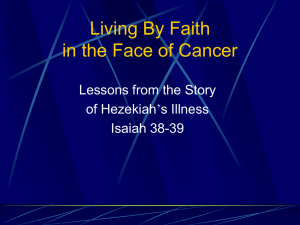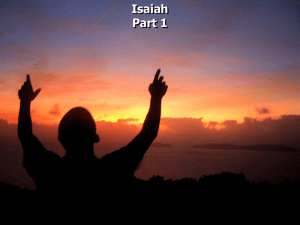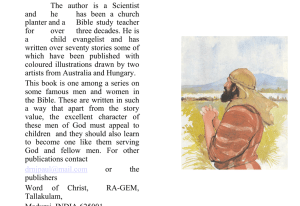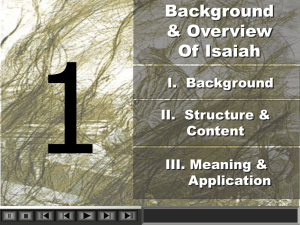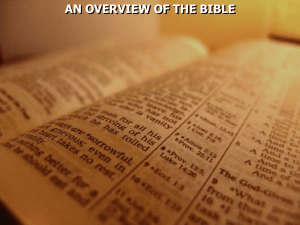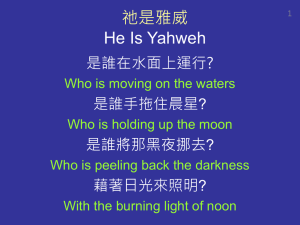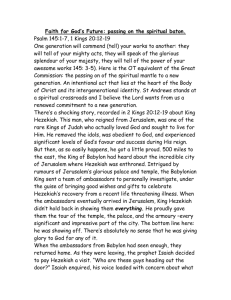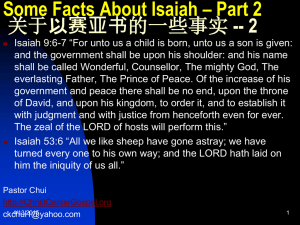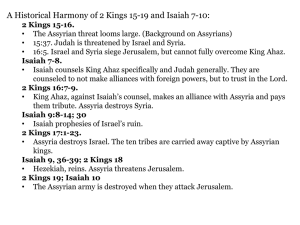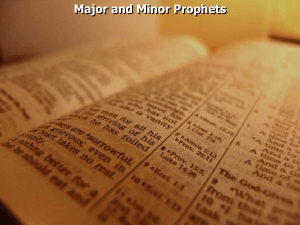Isaiah 7:1-9
advertisement
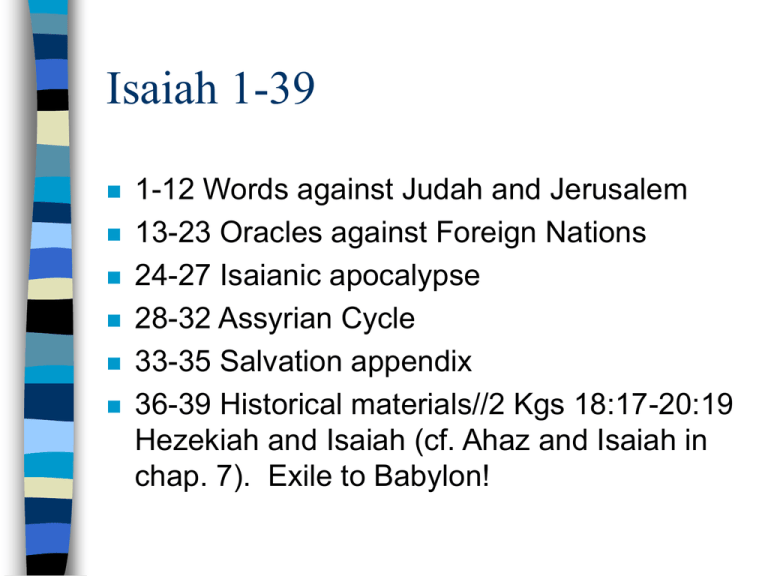
Isaiah 1-39 1-12 Words against Judah and Jerusalem 13-23 Oracles against Foreign Nations 24-27 Isaianic apocalypse 28-32 Assyrian Cycle 33-35 Salvation appendix 36-39 Historical materials//2 Kgs 18:17-20:19 Hezekiah and Isaiah (cf. Ahaz and Isaiah in chap. 7). Exile to Babylon! Events in Isaiah Syro Ephraimitic war 734-32 Ahaz king (chaps. 6-8) Revolt of Ashdod vs. Sargon II 711 Hezekiah king (chap. 20) Invasion of Sennacherib 701 Hezekiah king (chaps. 36-37) The Unity of Isaiah? Isaiah 1//Isaiah 65-66 Disobedience of Ahaz in 7-8//Faithfulness of Hezekiah in 36-39 Anticipation of Exile in 39; Exile presupposed in 40-55 This unity is literary or redactional, not historical Did 1-39 ever exist as a unit? Did 40-55 exist separately? Isaiah 1 and 65-66 Cultic abuses disrupt the relationship with God. I, Yahweh, am fed up with sacrifices. 1:11; 65:3; 66:3 There must be a separation between the righteous and the impious. All flesh will worship me…corpses of wicked who rebelled Judgment of impious leads to a resumption of relations with God. You will be “faithful city.” Isaiah 1 and 65-66 form an inclusion. Themes in Isaiah The fate of Zion – conditional on faith 28:14-22 (One who TRUSTS will not panic) – after defeat of Zion, its final vindication Future of Kingship – conditional on faith 7:9 (If you do not stand firm in FAITH, you will not stand firm at all) – after end of kingship, a new messianic figure in chaps 9 and 11 Exodus and covenant--absent in Isaiah 1-39! Outline of Isaiah 5 - 12 5:1-7 Song of the Vineyard 5:8-23 Woes specifying the indictment 5:25 Refrain: for all this his anger is not turned away…. Hence: 5:26-30 God will summon Assyrians as his agent Outline of Isaiah 5-12 continued 6:1-9:7 Memorandum about SyroEphraimitic War – 6 Call of Isaiah--legitimizes judgment that befalls Judah – 7 Shear Yashub and Immanuel – 8 Maher-Shalal-Hash-Baz – 9:1-7 Birth of new royal child Outline of Isaiah 5-12 continued 9:8-21 Refrain: for all this his anger is not turned away... 10:1-4a Woes specifying the indictment (refrain 10:4b: for all this his anger is not turned away) 10:5-34 Words against Assyrians 11 Messianic promises 12 Hymn of Thanksgiving (“my salvation” in v 2 may be a pun on the name Isaiah) Song of the Vineyard V. 1a Prophet’s introduction VV. 1b-2 Prophet comments on the vineyard owner’s expectations VV. 3-4 Owner’s (Yahweh) first address VV. 5-6 Owner’s second address/sentence V. 7 Prophet’s explanation (vineyard = Israel;; xpfm//jpvm; hq[c//hqdc) Isaiah’s Call--chapter 6 1-2 What the prophet saw--Yahweh enthroned 3-4 What the prophet heard--chorus of Seraphim 5-7 Prophet’s uncleanness and purification 8 Yahweh’s question and prophet’s response 9-10 Commission report 11-13 Prophet’s question and Yahweh’s response Isaiah 5-12 5:1-7 Song of the Vineyard (I will make it a waste, without rain) – 5:8-24 Woes that specify the indictment – 5:25 For all this his anger is not turned away – 5:26-30 God summons “a nation far way” (Assyria?) as his agent 6:1-9:7 Memorandum about the Syro-Ephraimite War – – – – 9:8-21 For all this his anger is not turned away 10:1-4a Woes that specify the indictment 10:4b For all this his anger is not turned away 10:5-34 Words against Assyria for its arrogance—remnant of Israel will lean on Yahweh—Yahweh the woodsman will chop down the tallest trees Sins condemned by Isaiah in Woes 5:8-10 people gobble up land 5:11-17 people drink wine to avoid social responsibility 5:20 people call good evil and vice versa (U. S. missiles are “peacemakers”) 5:23 people acquit guilty for a bribe 10:1-4 people use the law (oppressive statutes) to defraud the poor (Exod 21:4-6?) Isaiah 7:1-9 Context in Syro-Ephraimitic War Rezin of Syria and Pekah of Israel tried to force Ahaz, king of Judah, into an anti-Assyrian coalition. They intended to install the “son of Tabeel” (v 6) as a puppet king. Isaiah 7:1-9 (continued) Isaiah takes along Shear Jashub – “Only a remnant of the invading army will return home in safety,” “those who return to Yahweh in repentance will survive,” or “only a very few people will survive this catastrophe” – 10:21 a remnant will return to the mighty God; cf. 30:15 (In returning and rest you shall be saved) “Faith” in the book of Isaiah If you do not stand firm, you will not be made firm Isa 7:9 8:17 I shall wait for Yahweh and hope in him 10:20 the remnant will lean on Yahweh 30:20 In quietness and trust will be your strength--No! We will speed on horses 31:1 Alas for those who do not look to the Holy One of Israel Isaiah 7:10-14 Ahaz refuses the sign offered by Isaiah; cf. Deut 6:16: Do not put the LORD to the test. “Young woman” or “virgin”: Four things I do not understand: the way of eagle in the sky, of a serpent on a rock, of a ship on the seas, of a man and young woman making love. Prov 30:19 Identity of the Woman and the Meaning of Immanuel Ms. Ahaz--child = Hezekiah? Ms. Isaiah--children = Shear Jashub; Maher-shalal-hash-baz, and Immanuel? A woman whom Isaiah noticed in the vicinity? Collective (women in general)? God is with us--Is this good news or bad in 7:15-17? Isa 7:15-17 Six Choices Are curds and honey the food of prosperity (A-1) or the food of affliction (A-2)? Is “know” in v 15 to be understood temporally (B-1 By the time he knows) or as part of a result clause (B-2 so that he will know)? Is the choice between good and evil moral (C-1) or merely a sign of maturity (C-2 old enough to make his own decisions)? Isa 7:15-17 Six Choices Does Ephraim’s departure from Judah refer to the prosperous days before the breakup of United Monarchy (D-1) or the times of hardship immediately thereafter (D-2)? Is the “king of Assyria” in v 17 a gloss (E-1) or authentic (E-2)? Does he come against Judah or against Judah’s enemies? Is Immanuel positive (F-1) or negative (F-2)? Isa 7:15-17and the meaning of Immanuel 15 By the time (B1) that he has learnt to reject evil and choose good (C1), he will be eating curds and honey (A1); 16 before that child has learnt to reject evil and choose good, desolation will come upon the land before whose two kings you cower now. 17 The LORD will bring on you, your people, and your house, a time the like of which has not been seen since Ephraim broke away from Judah (D1, E1, F1). NEB D 1--good old days of United Kingdom E 1--king of Assyria deleted F 1 Immanuel--God is with us positively. Isa 7:15-17 and the Meaning of Immanuel 15 He will eat the sparse fare of curds and honey (A2) so that (B2) he will know how to reject what is wrong and choose what is right (C1). 16 For before the boy learns how to reject what is wrong and choose what is right, the land whose two kings you now dread will be abandoned. 17 Yahweh will bring upon you, your people, and your father’s house bad days (D2), which have not existed since the aftermath of the time when Ephraim left Judah. That is, he will bring the king of Assyria (E2, F2). “God is with us” in judgment Further Oracles in 7-8 7:18-25 Assyria will devastate the land 8:1-4 Assyria will carry off Ephraim and Syria-Maher-shalal-hash-baz 8:5-8 Lack of faith leads to the Assyrian invasion of Immanuel’s land 8:9-10 “God with us” means defeat for nations 8:11-15 People should fear Yahweh rather than the nations 8:16-18 The Prophet and his children as signs Isaiah retires temporarily--waits for Yahweh, hopes in him Isaiah himself = Yahweh saves Shear-jashub = only a remnant will survive the coming disaster Immanuel = God is with us Maher-shalal-hash-baz = the spoil speeds, the prey hastens Isaiah 7-8//36-39 Isaiah and Ahaz//Isaiah and Hezekiah Ahaz shows unfaith in the crisis of 734-32 chs 7-8//Hezekiah shows his faith in the Assyrian crisis of 701 when Jerusalem is threatened with death 36-37 Hezekiah trusts in Yahweh during mortal illness ch 38 Isaiah 36-39 36:1-37:38//2 Kgs 18:13; 18:17-19:37 – 2 Kgs 18:14-16 Hezekiah capitulates to the Assyrian king— not included in Isaiah—no blemish on Hezekiah’s faith 38:1-22 Hezekiah’s illness, recovery, prayer of thanksgiving//2 Kgs 20:4-11. I will deliver you and this city from the hand of the king of Assyria. – Isaiah 38:9-20 Psalm of Hezekiah—without a parallel in Kings—shows Hezekiah’s faith 39:1-8//2 Kgs 20:12-19 Hezekiah welcomes a delegation from Babylon and Isaiah’s response – What is to be the fate of Jerusalem and the Davidic dynasty in view of threat posed by Babylon? Introduces Isaiah 40-55 Purpose of 36-39 Confirms prophetic power of Isaiah (hence no report of capitulation by Hezekiah or fall of Jerusalem to Assyrians) Yahweh cares for city during reign of faithful king Hezekiah Provides bridge between previous prophecies of Assyrian period and those of Babylonian exile Yahweh spared Jerusalem in the Assyrian period, but these chapters warn of darker days ahead—cf. chaps 7-8 Isaiah’s words of judgment in the Assyrian period are to be fulfilled in the Babylonian period Hezekiah, man of faith Faithful deeds of Hezekiah thrown into his teeth by foreigners 36:4-10 Hezekiah rends his garment, asks Isaiah to pray 37:1-2 Hezekiah prays, and his prayer turns Yahweh against Sennacherib 37:21-35 Signs offered by Yahweh are accepted by Hezekiah and not scorned 37:30, 38:7, 22 Swords into Plowshares Isa 2:2-5//Mic 4:1-5 Utopia? Heaven? God’s in-breaking future? – Liturgical response in Isa 2:5 (O household of Jacob, come let US walk in the light of Yahweh) and Mic 4:5 – Christian eschatology--1 Corinthians 15 Isaiah 1-33//34-66 1-33 anticipate punishment & restoration of Jerusalem, Judah, and Israel. 34-66 presuppose downfall of Edom and Babylon in the age of Zion’s restoration. 1-33 Yahweh’s sovereignty is future 34-66 this sovereignty is a current event (downfall of Edom 35 and the Assyrians 36-37; the rise of Cyrus) Isa 7:15-17 and the Meaning of Immanuel 15 By the time (B1) he is old enough to make his own decisions (C2), people will be drinking milk and honey (A1). 16 Even before that time comes, the lands of those two kings who terrify you will be deserted. 17 The LORD is going to bring on you, on your people, and on the whole royal family, days of trouble worse than any that have come since the kingdom of Israel separated from Judah (D2)--he is going to bring the king of Assyria (E2, F2). TEV
